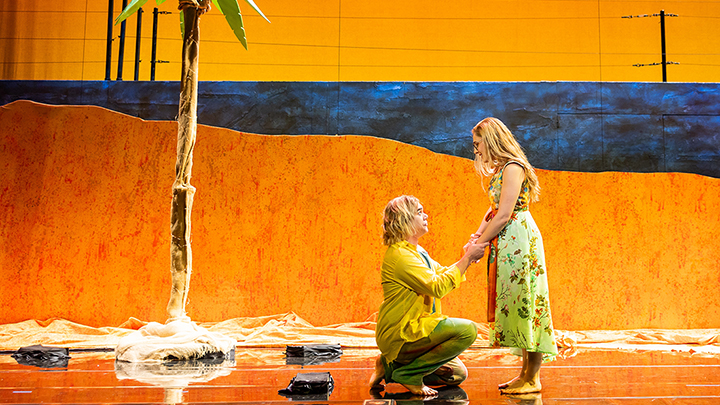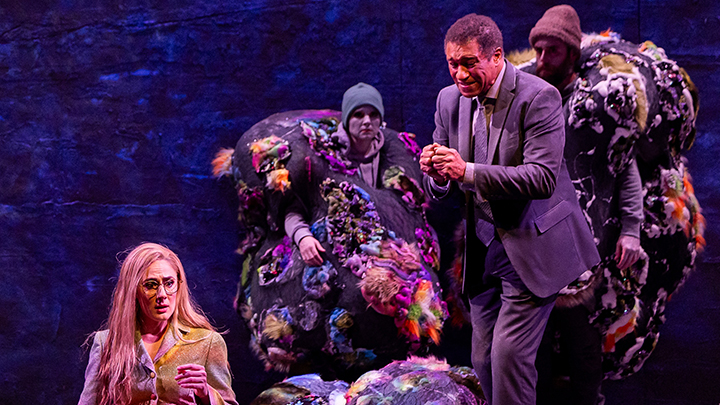
Such seems the question we might ask Matthew Aucoin of his Eurydice, which recently concluded a competent and thought-provoking run at Boston’s Huntington Theater courtesy of Boston Lyric Opera. An adaptation of Sarah Ruhl’s well-assembled play – itself a beacon of twee rituality – Aucoin’s setting of the Orpheus myth familiar to operagoers approaches the play from Eurydice’s side: here, her father prepares her a room in the underworld and memory of the living world becomes a contraband currency as deceased souls have their memories wiped by a dip in the Lethe. And when Eurydice is temporarily scooped up from the underworld by Orpheus, her father then has to mourn in reverse — mourn her absence from death — in one of the play’s more poignant and thought-provoking crosscurrents.
It’s significant that Ruhl initially refocused this myth in a straight-play format; if Orpheus is the musician par excellence, Ruhl ascribes to Eurydice a verbal power to complement Orpheus’s musical acumen that both ties the play firmly to its medium yet inevitably gestures towards an incompatibility between the two (that perhaps opera can remedy). But Ruhl’s Orpheus is a punk whose interest in Eurydice’s words just belies an interest in her boobs: “Orpheus never liked words. He had his music,” she says. She quotes him again: “Words can mean anything. Show me your body.”
Clearly Aucoin enjoyed the challenge of wrestling with a source material that so naturally suggests opera yet pits us firmly against music and his through-composed score is richly citational (I clocked Vivaldi, Wagner, and Coldplay, though I’m sure I missed others – and the most frequently recurring motif, an eighth-note sequence, has intervals reminiscent of the moment in Salome when Jochanaan emerges from his cistern) and unmistakably composerly. But while I suspect all the musical shoutouts that emerge from a this layered orchestration are supposed to push against this judgement, in a score as self-consciously musical as this one, they just seem decorative and self-congratulatory.
“Don’t you think that you are enjoying your grief just a little bit too much?” Hades asks Orpheus when he arrives to the Underworld; we can ask the same about Aucoin and his own score, a score that vacillates between pursuit and encounter while circuitously probing clichés like “What’s it like to love an artist?” By the end, Orpheus is back in the underworld, assumedly post-maenads, and can’t decipher the letter Eurydice has written him. It’s the first time we hear him with no sign of his countertenor double, a sort of floating indication that Orpheus is not a complete musician without a feminized (ie. Treble) complement (and that’s to say nothing of Eurydice!). As the opera ends in a sort of anticlimactic silence, the musician to end them all ends up being not Orpheus, but Aucoin.
Yet pretentious as it is, Eurydice is still a pleasant way to spend a few hours and Ruhl’s libretto is not without its genuinely moving moments. That BLO’s performances occasioned the newly commissioned chamber orchestration (in conjunction with Opera Grand Rapids) offers Eurydice an easy off-ramp into the regional circuit, is a welcome thing for any contemporary opera. And BLO’s performance was, largely, enjoyable. Having the composer conduct his own new arrangement—I didn’t see the Met run, but found this version quite satisfying, if slightly underpowered at certain moments, like the Act I dance–was a genuine luxury.
Sydney Mancasola is admirable as Eurydice, ultimately not a particularly grateful part. She was tireless in her music’s relentless octave jumps with her opalescent soprano maintaining a baleful elegance even in her upper reaches. She has an affecting chemistry with her father, Mark S. Doss, whose bass-baritone is unsteady and turned chalky the lower he went. Elliot Madore’s beach bum Orpheus has an impenetrable quality and he hammers his voice into tensile phrases effectively but without much nuance.
The opera’s most memorable innovation – the three bureaucratic stones at the gates of the Underworld that bicker and comment like a Greek chorus – were the winning trio of last-minute replacement Vera Savage, Neil Ferreira, and Maggie Finnegan. Though as Hades, David Portillo will be more remembered for his outrageous drag queen costumes rather than his singing – and the less said about his brief retreat into falsetto, the better. Speaking of which, countertenor Nicholas Kelliher, who voices Orpheus’s double, sings with line but little definition. The same can be said of Douglas Fitch’s production (he claims credit for staging, set, and costumes) which meanders along with the score.
This performance – which I caught on Sunday – heralded the end of the mainstage season for BLO which will resume fully-staged performances in the fall under the new artistic direction of Nina Yoshida Nelsen (who was involved with Madama Butterfly last fall).
Photos: Nile Scott Studio



























Comments